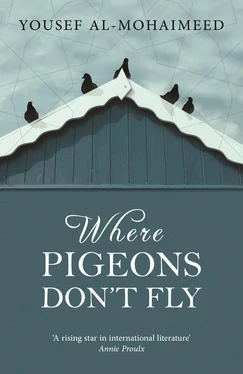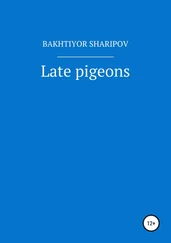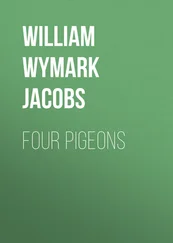But this furnishes them with no excuse, for the hadith is concerned with rights of the individual: the rulers’ monopolisation of booty and plunder and the like. Religion is not one of the rights of an individual, where forbearance in the face of preferential treatment is urged. In the hadith the man says, ‘… and they deny us our rights,’ but when the right is that of God, then no: the duty then is to reject the legitimacy of those who fail to implement God’s law .
The commander tossed the pamphlet to one end of the table.
‘God preserve us!’ said one of the officers. ‘That’s outright sedition!’
The commander nodded his head in agreement. ‘Planning a coup, it seems.’
The third officer remained silent, averting his eyes from the others. Then he excused himself and left the office.
Seven impounded vehicles in a military post on the Kuwait border, were laden with vast quantities of pamphlets churned out by the Vanguard printing presses in Kuwait and destined for remote villages and farms around Riyadh and Mecca, where they would be handed out to members of the group who, with precisely coordinated and pre-arranged timing, would distribute them through major urban centres such as Mecca, Riyadh, Qaseem and Ha’il.
Suleiman led his own small group, delegating tasks with the spirit of a practised leader of men, his abundant vigour sometimes beguiling other worshippers into helping his companions and himself distribute the booklets, blissfully unaware of the incitement they contained against the government and what they termed jahili society.
Seven years later, by a strange twist of fate, Suleiman al-Safeelawi was transformed from a distributor of clandestine literature into a distributor of newspapers for a major company.
He had descended ravenously on newspapers after being denied them during his first period of incarceration. He had often thought of writing his memoirs in prison, believing his time as a member of the Salafist Group had been far superior to the childhood memories recorded by Taha Hussein in The Days . Yet despite his love of reading, his writing and his powers of description, metaphor and composition were no match for the great wordsmith. It was as though the Alfiyya marked the division between reading for pleasure and enforced study.
Running from Ibn Malik, he had fallen, seduced and thrilled, for Sayyid Qutb, al-Albani and Hamoud al-Tuwaijri, and then, having emerged from prison, taken a job at the newspaper distribution company, married and enrolled at King Abdul Aziz University, he sequestered himself away with a new series of books, dividing his time between classical Islamic works such as The Unique Necklace, The Book of Animals and The Delicacies of the Caliphs and the Jests of the Refined , and the Russian classics, getting hold of Dostoyevsky’s complete works. Crime and Punishment, The Idiot, The Adolescent and The Brothers Karamazov transported him to another world, far from petty doctrinal quarrels.
After he had been promoted and his street level wanderings were behind him he would read all the time, even during office hours. At home, he would steal an hour to himself after sunset, though he still maintained his habit of dropping everything half an hour before the daylight disappeared and driving westwards over Urouba Bridge. It was as if he needed to satisfy himself that the sun had gone down to its resting place, as if he wanted to remember that distant sunrise over Jurida Square, when they escorted him away to be interrogated and from there to a series of long and arduous adventures in prison.
— 34 —
JUST BEFORE SUNSET THAMAMA Road was relatively crowded, the ice cream vans scattered eye-catchingly either side of the road as Fahd drove along, suffering beneath the yellow disc of the sun.
Every sunrise and sunset that passed before Fahd’s eyes wrung his heart and reminded him of his father on that final morning, a memory that led him back to thoughts of his two uncles and Yasser. He remembered his childhood, when his uncle took them all to a nearby farm to learn to swim. The pond was deep and shaded by the tops of tall palms and verdant trees. His uncle said that swimming in shady water would strengthen their young hearts, as if he intended to turn them into black rocks, unbreakable and incapable of bringing light to the world.
Whenever Fahd thought of them he wished that one day they would all go on a trip together and that the family car would swerve and flip over repeatedly or smash into a stray camel crossing the road, leaving no one alive. How wonderful it would be to celebrate their deaths! Of course, nobody’s death should be a matter of celebration, even those they called ‘infidels’, the ones al-Qaeda slaughter like sheep. The time he had opened a video clip on an Islamic website to find members of al-Qaeda butchering a terrified foreigner had terrified him and left him nauseous and he had fasted for a whole week.
He sometimes felt that those around him were the true heirs of al-Qaeda. The only difference was that out there they first trained in arms and laid waste to the West, then turned their attention to their own homelands, claiming they were in thrall to the infidel. In Riyadh and Qaseem, meanwhile, they merely supported their deeds and cheered.
Fahd still remembered September 11. He was in Bassam on Ulaya Street looking for a cheap microwave oven and the televisions were aglow. His attention was drawn by a group of middle-aged men gathering to stand astonished in front of the screens, watching the aircraft as they detonated into the twin towers of the World Trade Center. Three of the men were applauding gleefully. Two were clean-shaven and the third had a slight beard and they clapped as though following a video game or some movie where good triumphs over evil. Later, Fahd would think of them and ask himself: where are those joyful men now? Were they amongst those who blew up the Muhiya Compound or the Hamra Oasis Village? The Civil Affairs building in Riyadh, perhaps? Are they in Iraq? Were they amongst those who joined the Fatah al-Islam Brigade in northern Lebanon, their corpses sprawled out in the Nahr al-Bared refugee camp?
It terrified him to think that people here were in crisis, hostile to anything advocating progress. When you explained that progress was the inescapable destiny of all things, then talked to them of their errors — from their rejection of the telegram and the radio on the grounds that they were sorcery and devilry, to their refusal to accept television and women’s education, to their repudiation of the latest innovations such as identity cards for women — they would shut you up, using force if necessary. They would end the debate on the grounds that your faith was weak and your doctrine unsound and then, without any hesitation, inform you that you were a secularist preaching degeneracy or a filthy liberal, maybe growing aggressive enough to declare you an apostate whose killing was permissible by law.
He still remembered that episode of The Other Direction , a programme he sometimes watched despite hating it for being contrived. On one side of the debate was Sayyid al-Qamani, who opined that there was no democracy anywhere in Islamic history. How could there be, when the Emirate of the Muslims passed from one Caliph to another by means of poisoned dagger or cup? The other guest wore a turban and was called al-Sebaei. Provoked, he roundly abused al-Qamani, describing him as a monkey and an apostate from religion, and all this live on air in front of millions.
The speed monitor began to tick steadily as Fahd exceeded 120 kilometres per hour. He decelerated and his attention was caught by an Egyptian labourer at the side of the road, who was setting out upturned chrome bowls along a board lying across the tops of four barrels. Next to him was a camel pen surrounded by barbed wire and a gaggle of motorists handing over the price of a bowlful of fresh milk. He would squeeze out a bowl in front of them and they would gulp the milk down until the foam filled their noses and covered their moustaches, then continue on their way, belching as they inserted a tape of Islamic songs hymning the former glories of the Muslim world and extolling the Kalashnikov, the grave and the life hereafter.
Читать дальше












